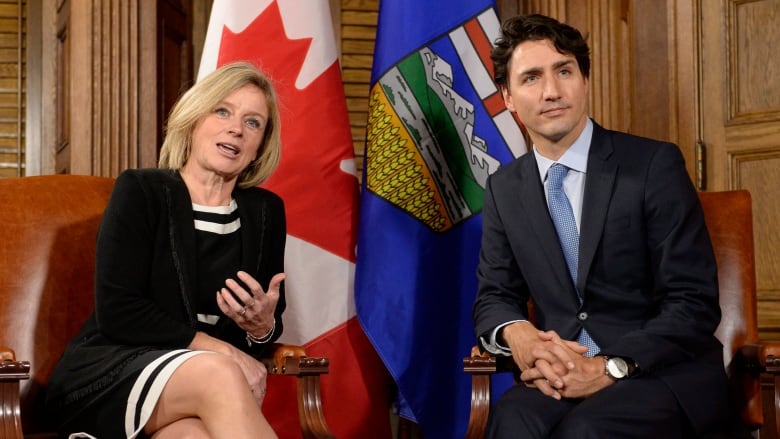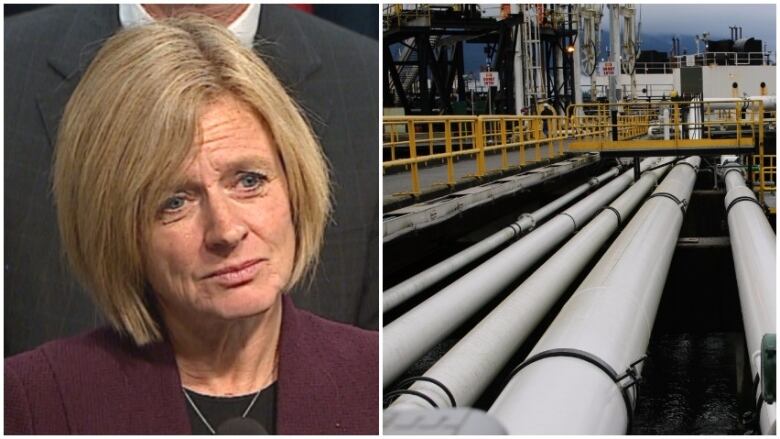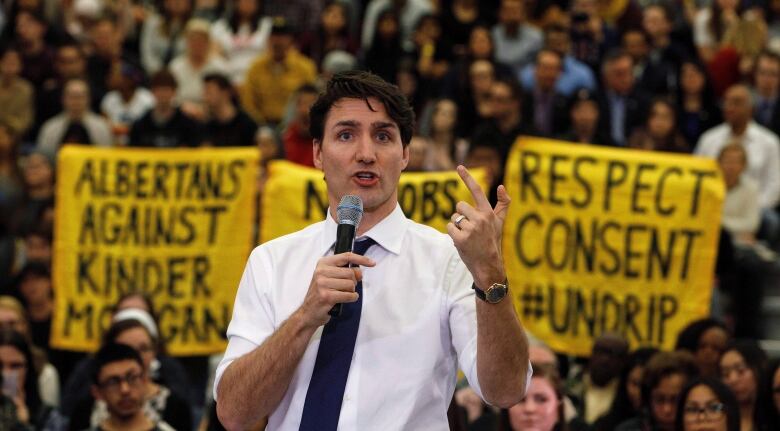The Alberta vs. B.C. pipeline fight. Now it's war.
After years of trying to play nice, it's simply come to this: Diplomacy has failed


Brother turned against sister this week. The House of the West divided.
It's hippie vs. rig pig; British Columbia against Alberta.
B.C. Premier John Horgan announced this week plans to bar increases to diluted bitumen shipments off his coast until the province conducts an extensive study of the crude's effects in water.It'sa direct challenge to the TransMountain pipeline. Alberta Premier Rachel Notley responded in kind, vowing to suspend electricity purchase contracts from B.C.
- Alberta premier threatens economic retaliation against B.C. over bitumen restrictions
- Rowdy crowd of anti-pipeline hecklers take on Trudeau at B.C. town hall
That province, she said, "does not have the right to rewrite our constitution and assume powers for itself that it does not have. If it did, our confederation would be meaningless."
This isn't about one pipeline.
Alberta has been at the wrong end of environmental backlash and anti-pipeline rhetoric for years. If TransMountainis allowed to falter, it risks setting a precedent that will undermine the federal government's role as pan-Canadian regulator. What good is a constitution, or a federation, if every piece of inter-provincial infrastructure risks becoming a bare-knuckled scrap? If every demand is met with threats of trade retribution? If we lack trust in the federal government to govern fairly?
Ragging the puck
Indeed, the federal government is largely understood to maintain jurisdiction over inter-provincial pipelines, and has granted approval of the TransMountain expansion despite the opposition of B.C. residents and politicians.
Granted, the existence of unceded First Nations territory complicates matters, legally. But there is little doubt that the B.C. government's latest announcement is an example of ragging the puck introducing more uncertainty and delay in the hopes that TransMountain's parent company, Kinder Morgan, bails on the already stalled project.

The municipality of Burnaby has mastered this game, refusing to grant permits within the city. Such an outcome will raise serious doubts about investing in Canada in the short term. In the long term, it could undermine the economic underpinnings of the country altogether.
At the very least,TransMountainlooks like it is headed for more injunctions, more court appearances, more divisive rhetoric. For people in Alberta, this is more than just a political game. Real lives, real royalty revenues hang in the balance as both sides score points for their respective sides in an increasingly polarized battle.
More than a few B.C. based activists and academics have quietly noted to me the irony of Notley's strong language. Isn't Alberta, after all, the province most opposed to federal overreach? Surely the land of the National Energy Program can empathize with a province standing up for its own interests; for fighting the will of Ottawa.
Perhaps it could. B.C. might earn a little goodwill by framing the issue this way.
But this fight has dragged on too long, and we are all well past empathy.
Alberta has suffered an economic downturn for years, resulting in high unemployment. Meanwhile the anti-pipeline rhetoric has been unceasing. According to a recently released C.D. Howe Institute report, the current pipeline bottleneck is knocking off $5 of profit per barrel in this province; a loss of tens of millions of dollars per day.
The Alberta rebuttal should be twofold.
This is war
Firstly, throw out the false comparisons.
The National Energy Program fiasco is in no way analogous to a pipeline approval. The NEP was an attempt by Ottawa to divert Alberta's natural resource revenues before the fact of their ownership had been established in the constitution. Alberta's intransigence on that front was eventually negotiated in the provinces' favour, to the benefit of both Alberta and B.C.
By comparison, a jurisdictional model that undermines federal authority over infrastructure and constantly shifts the goal posts risks making all kinds of interprovincial trade and infrastructure projects practically difficult and uncertain. Perhaps so difficult and uncertain that major companies simply won't be willing to risk the huge outlays of capital needed to risk such an investment.

This isn't a question of a province or federal government winning or losing. It's a zero-sum game for everyone.
Secondly, while Alberta might be sympathetic by nature to a province telling Ottawa where to shove it, this province has largely abandoned all hope that B.C. is operating in good faith. Alberta elected an NDP government and implemented the most stringent carbon tax in the country. It put a cap on oilsand greenhouse gas emissions, and all for what?
Too many people in B.C. are opposed to Alberta's most crucial industry. They see this province as mining dirty, polluting oil, and as such, they virtuously oppose the supply which allows all "right-minded" Canadians to overlook the demand.
There is nothing that Alberta can do to win the "social licence" necessary to win approval for an expansion of a pipeline that has operated for 64 years; a plain old "licence licence" will have to suffice.
After years of trying play nice, it's simply come to this: Diplomacy has failed.
Now, it's war. Trade war, to be specific.
Sticking to its guns
The federal government is going to have to abide by its regulatory decision, or its credibility as a unifying political entity will begin to fail in favour of a model in which each province is out for itself. Thus, we'd all be engaged in a never-ending economic tit-for-tat at each other's expense. We are seeing the dangers of this right now.
Notley can't afford to apply the soft touch anymore.
She has United Conservative Party leader Jason (Alberta firewall)Kenney on her heels, and he's already promised to pull permits on oil shipments into the Lower Mainland as a retaliatory measure. And what happens to Alberta's carbon tax, or the federal government's hopes for a "pan-Canadian framework"on climate change, then?

Allowing B.C. to pull stall tactics until Kinder Morgan buckleswill set a terrible precedent for major infrastructure investment across the country. Nice words and sunny ways and matching socks aren't going to get it done: the hour is late, Mr. Trudeau.
This isn't about Rolexes and caviar
"That pipeline is going to get built," Trudeau said to an Edmonton talk radio station, CHED, on Thursday. "We will stand by our decision. We will ensure that the Kinder Morgan pipeline gets built."
We will see.
The more obstacles and delay B.C. can throw at Kinder Morgan even if they be in the form of a proposal in a press release the more money Alberta loses. And that's not money that's going into Rolexes and Caviar; it's cash that would go to hospitals and schools, to federal taxesand to economic revival.
The irony is that this pipeline debate won't fall on ideological lines at all.
All of the parties politicized or undermined the credibility of the National Energy Board in order to score points with their respective bases. The federal Conservatives began this game in 2012 by shifting ultimate approval for pipelines to the federal cabinet instead of the National Energy Board. This became the lever by which left-leaning parties began to chip away at the impartiality and credibility of the federal regulator.
In the end, it will be the federal Liberals and provincial NDPsperhaps those least inclined to be sympathetic to oil and gas development who now must push this line through in the ugliest way possible.
A pox on all their houses.
Calgary: The Road Ahead is CBC Calgary's special focus on our city as it passes through the crucible of the downturn: the challenges we face, and the possible solutions as we explore what kind of Calgary we want to create. Have an idea? Email us at calgarytheroadahead@cbc.ca
More stories from the series:
- The NDP and a possible path to a second victory
- No, Calgary is not losing 7,000 businesses a year, despite what you've heard
- Why Alberta's economic 'recovery' feels so different this time
This column is an opinion. For more information about our commentary section, please read thiseditor's blogand ourFAQ.












_(720p).jpg)


 OFFICIAL HD MUSIC VIDEO.jpg)
.jpg)



























































































